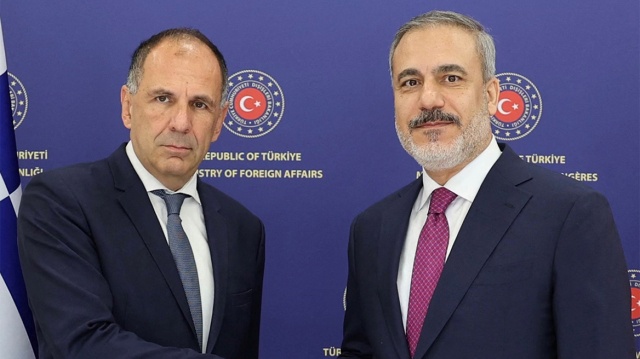During a private dinner in Istanbul, Greek Foreign Minister Giorgos Gerapetritis and Turkish Foreign Minister Hakan Fidan discussed the future of Greek-Turkish relations ahead of Turkish President Recep Tayyip Erdoğan’s upcoming visit to the Turkish-occupied region of Cyprus. A primary objective is to establish a date for the next High-Level Cooperation Council meeting, as internal tensions in Turkey rise over issues like maritime spatial planning and the Crete-Cyprus electricity cable.
Greece aims to create a new equilibrium in its relations with Turkey, especially following its approval of the Maritime Spatial Plan (ΘΧΣ), which has elicited a cautious initial response from Ankara. While this response has been restrained, it may not fully represent Turkey’s overall position.
The foreign ministers plan to continue their discussions at the NATO ministerial summit in Antalya on May 14-15, striving to maintain a sense of normalcy in bilateral relations despite persistent disputes. Both nations hope to convene the High-Level Cooperation Council before summer to avoid the perception of stagnation in diplomatic efforts.
Erdoğan’s visit to northern Cyprus is anticipated to solidify Ankara’s position, as he is expected to dismiss calls for a federal solution and promote a two-state model for the island. This, coupled with increasing internal critique of Greece’s ΘΧΣ, raises alarms in Athens about potential Turkish actions in the region.
Following Greece’s adoption of the ΘΧΣ during Holy Week, Turkish media and opposition groups reacted strongly, accusing Erdoğan of capitulating to Greek claims in the Aegean and Eastern Mediterranean. Critics assert that the Greek ΘΧΣ lends legitimacy to the “Seville Map,” endorses Greece’s rights over contested islets, and implies a 12-nautical-mile territorial sea, despite this not being explicitly stated.
Recent Greek defense initiatives, including the “Achilles’ Shield” program and enhanced defense partnerships with the U.S., along with collaboration with Israel and Cyprus, have heightened Turkish apprehension. Meanwhile, Ankara has finalized its maritime spatial plan in line with the “Blue Homeland” doctrine, preparing to submit it to the UN.
Looking ahead, the resumption of work on the undersea cable between Crete and Cyprus, as well as the establishment of marine parks, will be crucial points of contention. While these projects are expected to advance, the Greek government appears to prefer a cautious approach to avoid escalating tensions.
Despite Turkey’s internal political pressures and attempts to counter the increasing international recognition of the Republic of Cyprus, the High-Level Cooperation Council remains a key diplomatic focus for Athens. This includes the opening of embassies in Nicosia by Central Asian Turkic states and agreements aligned with UN resolutions denouncing the “TRNC.”
During his visit to the occupied territories on May 4, Erdoğan is likely to inaugurate new government buildings and a “presidential palace” funded by Ankara, reiterating his support for the “TRNC” and promoting a two-state solution. Concurrently, the “TEKNOFEST” tech expo will take place in northern Nicosia to showcase closer ties with Turkey.
Ask me anything
Explore related questions

















